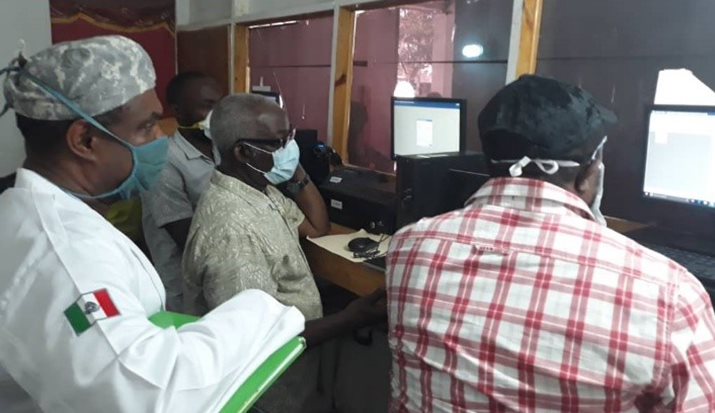Enabling Better Management of Hospital Finances: The Success of Electronic Cash Registers
Enabling Better Management of Hospital Finances: The Success of Electronic Cash Registers
![[Left to right: Mr. Louis Zicot, DAB computer scientist; Mr. Josma St-Louis, MSPP programming lead; Mr. Hibart Valny, DAB/MSPP electronic and computer engineer; Ms. Marie Carmelle Placide, responsible for the registers at the HSTH]](https://msh.org/wp-content/uploads/2021/07/photo_1.715px_3.jpg)
Improving the management and amount of internal revenue for hospitals is a priority for the Ministère de la Santé Publique et de la Population (MSPP) in Haiti. However, there are significant delays in allocating public funds to hospitals. Funds are often only available during the last month of the fiscal year, which forces hospitals to rely on their own revenue when faced with emergencies. This context creates a number of issues, including hospitals that lack needed equipment for accounting and other administrative work. This situation has become critical with the COVID-19 pandemic, as procurement of personal protective equipment and oxygen tanks was only possible using revenue from the hospitals.
![[Electronic registers at HUJ]](https://msh.org/wp-content/uploads/2020/07/photo_3.715px_0.jpg)
The lack of internal revenue in health facilities has become an increasing concern as the MSPP looks to transition nearly 5,000 HIV health workers from donor-paid to government-paid staff. Finding the funds to absorb this staff into the Haitian government’s budget is a large undertaking that requires innovative and cost-effective strategies. The implementation of electronic cash registers has proven to be one potential solution, as these machines have allowed hospitals to boost internal funding at a time when they need it most and pave the way for stronger financial management systems.
Electronic registers help facilitate accounting (collecting and managing revenue), improve the use of resources (managing stock and monitoring services of care) in hospitals, and allow health facilities to provide quality patient care. The USAID-funded Health Leadership Project (HLP) has supported the MSPP to continue the installation of electronic registers and to monitor the functioning of existing registers in 9 of the 10 departmental hospitals and the Hôpital de l’Université d’État d’Haïti (HUEH). HLP has now helped facilitate the installation of 36 registers and solar panel systems across 14 facilities, 12 of which are funded by PEPFAR.
The first registers, which have been funded by USAID since 2018, were installed before the implementation of HLP and already have a good reputation in the country. Dr. Marie Gréta Roy Clément, Minister of Public Health and of the Population, indicated in an address to the Ministry’s staff in 2019: “The governance and management of the sector have improved. Internal revenues of our hospitals have significantly increased with the introduction of electronic registers.”

HLP scale-up of a proven intervention for increasing hospital revenue
HLP provided both technical and financial support to health facilities to prepare for the scale-up of the installation and use of cash registers.
The Direction de l’Administration et du Budget (DAB) of the MSPP performed an on-site mission March 15–April 17, 2020, with support from HLP to assess the functioning of existing electronic registers and identify the needs for installing new registers.
This assessment was conducted during the COVID-19 pandemic due to its importance for the health system. The team relied on the response plan developed by the MSPP and practiced social distancing to protect the health of those participating in the activity. HLP’s advisor for health financing used remote working tools such as video conference software and instant messaging applications to provide support to teams to revise terms of reference and data collection tools.
Following this work and despite restrictive measures due to COVID-19, the DAB was able to carry out a number of visits in the hospitals of the health departments in the west as well as the Hôpital Immaculée Conception de Port de Paix (Nord-Ouest), the Hôpital de la Providence des Gonaïves (Artibonite), the Hôpital Universitaire Justinien (HUJ) du Cap-Haïtien (Nord), the Hôpital de Fort-Liberté, the Hôpital Communautaire de Référence de Ouanaminthe (Nord-Est), and the Hôpital Sainte-Thérèse de Hinche (Centre).
The team provided direct assistance to verify, update, and repair software for the electronic registers’ systems in the hospitals where the machines had already been installed.
Impact of cash registers
Electronic registers have been successful in increasing hospital revenue, from a 9% increase at HUEH to a 66% increase at HUJand a 24% increase at HST. Among the hospitals visited, the average increase was 48%.

Note: Cash registers in these hospitals were installed prior to HLP.
For hospitals that do not receive their budget in time, the revenue from the registers allows them to deal with emergencies. With the COVID-19 pandemic, the money generated by this initiative has enabled the hospitals to rapidly mobilize and purchase personal protective equipment (gloves, masks, and hand sanitizer).
![[Ms. Anne Berline, cashier at the Hôpital Immaculée Conception de Port de Paix; Mr. Josma St-Louis; Mr. Hibart Valny; and Mr. Merzier Jean Ernst, accountant for DAB/MSPP.]](https://msh.org/wp-content/uploads/2020/07/photo_5.715px_0.jpg)
COVID-19 has highlighted the pre-existing need to strengthen the financial capacity of health facilities, especially those outside of the capital city of Port-au-Prince, to improve the taxation system for local taxpayers and reduce financial dependence on direct payments.
The installation of electronic registers is a significant step in that direction. As indicated by Georges Koné, Technical Advisor for HLP, “The electronic registers contribute not only to a healthy financial management of hospitals but they also help increase the capacities of the hospitals to provide sustainable quality care to patients.” Due to this joint initiative between the MSPP and HLP, numerous health facilities in Haiti are now able to benefit from the use of these registers and improve their financial sustainability. The MSPP plans to utilize the research and technical support it has received to install at least another 10 electronic registers in the future.